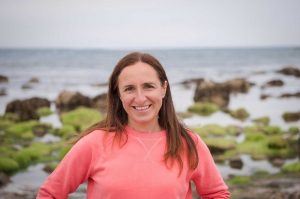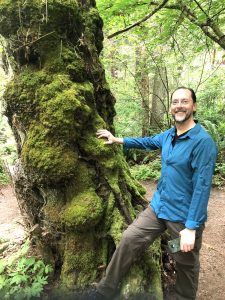
New Year’s resolutions, while often well-intentioned, are usually unlikely to stick around and lead to real change. This is because many of us have a hard time making realistic, clearly defined goals. Besides struggling to set clear goals, we often find it difficult to even begin the process of understanding the root causes of the habits we would like to change. Often, it is our mindset and overall sense of wellbeing that affects how we carry out our New Year’s resolutions. Whether we’ve committed to exercising more or having a better work-life balance, a strong sense of wellbeing (be that physical, emotional, mental, or spiritual) can help build the solid foundation needed to achieve these goals and live a meaningful life.
For Finlay Wilson, the message rings clear. A yoga teacher living in Dundee, Scotland, he has been practicing the discipline for over 10 years. “I owe my current mobility to my yoga practice. Beyond the physical, the breath work and meditative aspects of my practice help in almost every daily situation.”
As it is with many others, the benefits of yoga are more than just physical for Wilson. Healthy yoga practice also contributes to mental and emotional wellbeing. One of his greatest joys is witnessing his students evolve. “Along with physical capabilities, I get to see comfort in them, a softening of the walls where they are practicing acceptance of themselves.”
Wilson’s journey to becoming a yoga teacher began 17 years ago during university. “I needed surgery on both of my legs. I lived slightly out of town and the walk was too much, so I went to the gym next door and started yoga classes once a week. I wasn’t met with a very welcoming attitude as I couldn’t stand for any period of time, and this seemed to flummox the instructor. But, as it was pre-YouTube days, I didn’t have the same access to resources I would have now, so I stuck with it. Over time I noticed a shift in how I felt, and I began a daily 20-minute practice. This became something that saw me through my remaining years at university and the full recovery of my legs.”
Wilson is mindful that, for some, the thought of starting a new fitness routine can be daunting. In response, Wilson ensures that everyone feels comfortable in his studio. “Both my husband Alan and I work in a way that there is always something you can do. Regardless of mobility, age, or ability, there is a part of each pose that can do something.
“Exploring that with grace, patience and persistence brings many of the philosophical elements of yoga into practice.”

Given that yoga is accessible in some form to anyone wishing to practice, Wilson admits that he finds it challenging when he encounters someone who lacks motivation.
“Willpower is something I have never lacked. So, one of the biggest challenges is when teaching someone who doesn’t have the drive to practice, or seemingly doesn’t want to do anything. Even though you shouldn’t, you begin to feel like you have failed that person.”
Lacking motivation is a big reason why many people fail to see their New Year’s resolutions through. But, just like the muscles in your body, willpower can be strengthened over time, and investing in our emotional and mental wellbeing is essential.
Scottish life coach Lyn Ray, who is currently based in Edinburgh, recognizes the power of investing in our mental and emotional wellbeing. Through her coaching practice, Ray supports people to “live and work in a way that works for them. When we are happy, energized and fulfilled in our lives, this ripples out positively to everyone around us.”
Ray first came to life coaching after experiencing burnout in the wake of a difficult time for her family’s business. “By the end, I was mentally and physically exhausted. One Saturday, I met my cousin. She looked at me and asked how I was. I replied, the standard Scottish reply, “I’m fine.” I was far from fine. I was struggling to hold it together and knew something had to change. She asked if I had tried meditating, sent me a link to the Headspace App and shared “The Miracle Morning” by Hal Elrod with me on Audible. That conversation changed my life.
“Over time I felt calmer and better able to concentrate. I listened to one personal development book after another, making small changes to my life as I went. My social media feed reflected this interest and one day in 2019 an advert came up for a free taster day for a Diploma in Transformational Coaching. I went along and that was the start of my adventure into coaching. I then retrained as a coach and set up my own practice.”
Ray’s first-hand experience with major life changes makes her work as a life coach unique. Whether it is “perfectionism, procrastination, not feeling good enough, being anxious, experiencing imposter syndrome, or feeling stuck, I understand the impact of these first-hand, so it’s rewarding to me when clients tell me the positive impact our work has had on their life.”

Key to Ray’s successful practice is the emphasis she places on actions. “I work with clients to agree to the actions they want to take and to hold them accountable to take them. We will never think our way to a better life, and a miracle is not coming, it takes commitment and action to change your life.”
In addition to strengthening our physical, mental, and emotional wellbeing through healthy practices like yoga and life coaching, we can also improve our spiritual wellbeing.
For just as we are minds and bodies, we are also souls. And, in the Celtic world especially, spiritual wellbeing is key to a meaningful life.
Celtic Spiritual Director Dr. Kirk Webb identifies the ways in which we can cultivate a healthy spiritual practice. “Some of those practices are prayer and meditation, study, “sitting” in and with nature, use of imagination and creativity, reading and writing of poetry and prayers, and engagement in rituals that note natural events such as the cycles of nature.”
Webb, who has both Scottish and Irish roots, grew up in the southeastern Appalachian Mountains of the United States. He now lives north of Seattle in the “soul-awakening landscape” of the Salish Sea shore. Webb turned to Celtic spirituality after growing disillusioned with some of the elements of his previous religion. As a young adult, he adopted a conservative Christian American version of faith. Some years later, however, “the fear-based anxiety and the divisive energy of that perspective ceased to hold my attention.”
The real change came after Webb travelled to Ireland and Scotland. “I felt a compelling soul-stirring by stepping onto those lands. Something of the land was quite tangibly holding me. The Celtic teachers, landscape, myths, practices, ruins, and people woke me back up to awareness of the closeness and power of Love, Divine presence through all of nature, and the dignity of each person. The ancient Celtic perspective saved me.”
The spiritual transformation that he experienced led him to launch the Celtic Center, an organization that supports those “who have lost their moorings and are searching to find new light in the old ways.” Through teaching, gathering, writing, and pilgrimages to Ireland, Webb joins others as they journey on their spiritual paths.
Rather than a top-down approach, his style of spiritual direction is best understood by the ancient Celtic tradition of Anam Cara, which translates to ‘Soul Friend’ in English. This concept lies at the heart of Celtic spirituality. “The ancient Celts believed that a life lived in utter solitude with no spiritual mentor or friend is a life that would inevitably collapse and bear little fruit. They encouraged every person to have a Soul Friend that provided regular and skilled listening so that each person’s story can be shared, held, and encouraged. A Soul Friend is not a spiritual authority, but instead guides by entering meaningful conversation and finding inspiration together.”

Webb places a strong emphasis on this relational aspect of spirituality. “These practices are never about me alone. They must propel us into acts of compassion, love, care, and justice. Care is a responsibility toward self, others, and nature in a myriad of ways.”
While his spiritual direction brings him great joy and purpose, Webb maintains that he must take care “not to be arrogant in the work. It is easy to slip out of humility and into arrogant thinking that I know the way instead of joining another follower as we humbly say that we discover the way together as we walk the way.”
Our society still has a lot of work to do in terms of investing in our collective and individual spiritual wellbeing, and Webb believes that our moment in time is critical.
“We are at a threshold point. Nationalistic political movements around the globe are threatening to destroy any progress regarding caring for others who are different than ourselves. Conversation and solution-building regarding climate change and care of the environment is stalled, mocked, and disbanded on many fronts. And we are encouraged to bow down to the great consumerist and money gods at all turns. The moment is not just bad, it is desperate. I can speak of this regarding the United States, but I suspect that it is also at least partially true in the Celtic lands and across the globe. We have lost our collective soul.”
When it comes to the current state of our mental and emotional wellbeing, Ray shares a similar perspective. “According to statistics from the Scottish Government around 1 in 4 people are estimated to be affected by mental health problems in Scotland at some point in their lifetime. When I look globally, other countries are facing similar challenges. People are stressed and unhappy.”
While issues surrounding wellbeing are complex, a shift in mindset can help us begin the journey towards self-healing – perhaps looking to another time in history.
“The ancient Celtic way stands ready to shed light on the path,” says Webb. “Obviously, we can’t go back to all of those ancient traditions, but those ancient mindsets and ways of joining our human development with the natural rhythms of nature in a respectful and symbiotic relationship are ready to inspire us toward new behaviours, beliefs, change, and redemptive engagement.”
Even though we may still commit ourselves to well-intentioned but perhaps overly ambitious goals, let us not forget to take the time to be gentle with ourselves. To care for our physical, emotional, mental, and spiritual wellbeing. Maybe that will involve going on a simple walk every day with a loved one, or picking up the phone to check in with an old friend, or attending a spiritual gathering in communion with others.
“The old is becoming new again,” Webb reflects. “And it is an honour to be part of that rebirth.”




















Leave a Comment